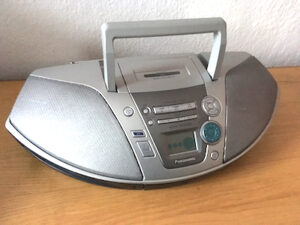Survival, not entertainment, once dictated what a child was taught.
 Sounds old-fashioned, doesn’t it? But the sentence resonates in our lives right now. Our three-year old granddaughter Patti has discovered the CD player! Yep, an old-fashioned, lightweight, metallic boom box that also sports a cassette player and a radio. All the media one could desire . . . back in 1984.
Sounds old-fashioned, doesn’t it? But the sentence resonates in our lives right now. Our three-year old granddaughter Patti has discovered the CD player! Yep, an old-fashioned, lightweight, metallic boom box that also sports a cassette player and a radio. All the media one could desire . . . back in 1984.
She’s delighted to realize what goes in which slot and which button does what. Her favorite one, of course, is the round one that opens the retractable CD rack. Do you remember the first time you saw one of those? Pretty cool, right?
Best of all, her explorations of the boom box are helping wean her away from a non-ceasing desire to place herself in front of every digital screen she spots. I’m guessing you know this phenomenon if you have small children in your life.
Toddlers may be drawn to the digital, but what they really want to do is push buttons, open and shut things, and admire the results of their cleverness. They want to engage in the physical world, to understand how to take it apart and put it together. Up until the digital age, such engagement was a small child’s primary job.
For most of our history, little ones needed to learn quickly how to handle the physical world, lest they stray too close to the mill wheel, or too near the spot where papa was splitting fire wood. Survival, not entertainment, dictated what a child was taught.
While living on our ranch in Bowie, Texas, I began to understand more about nature’s way of educating her young. Baby goats are up on their feet within hours of birth. They face many potential predators, and their mom’s ability to defend them is limited, so they’d better learn how to navigate fast. Calves take longer to get up, but the herd comes into play here, and mom is never far off.
To survive, baby animals must engage their physical world as quickly as possible. But I now witness, just as you do, a generation of little ones whose developmental paths in deciphering the physical world are being distorted by a damaging fixation on digital technology.
But wait, some say. Toddlers need to learn to master the digital world, don’t they? And they like it. Witness a baby’s desire to grab at digital objects as soon as their chubby little arms will allow.
Yes, that’s true. And they will also grab for a flame.
I watch this battle every day, not only in our own family, but in the vast majority of families I observe. Parents everywhere seem just to sigh and surrender phones and digital objects to the toddler’s wants. And, of course, it’s hard even to find toys that don’t bombard a child with flashing lights and ugly electronic sound parading as music.
But fighting the fight against the digital hypnotizing of our kids is worth it. Increasingly I find myself giving talks on this matter at various conferences. I know quite well that intellectually and developmentally positive alternatives provide part of the solution to the problem. Still, I hadn’t thought how much joy a child could have encountering an old boom box.
Skills Patti has learned thus far include discovering how to open and shut CD cases; learning to extract and properly hold CDs properly and insert them for play, understanding which of the many buttons activates CD versus cassette versus radio (a bit of pre-reading going on here, too).
Then there’s the fun of the volume button (yikes). “Matching” skills come into play too, as a CD or booklet needs to go back into the proper box (or, at least one that looks somewhat like it!). And those booklets—oh me, oh my! They have fun things in them, particularly children’s music CDs, where booklets have the words, the notes, and cute illustrations. Watching Patti sitting with the booklets, turning to a random page—the booklet upside down—and singing away couldn’t be sweeter.
No computer video can compete for the good to be gained here. Rather than sit immobile, with poor posture, blurry-eyed, staring at a small screen, she’s up, she’s down, she tilts her head, wondering what CD to pick, she dances, she twirls. And she doesn’t tire of it for a long, long time.
When she does, then she runs in and tells me “Come watch me, grandma. I am playing my music.” That’s real music to my ears. Plus she sings along with these tunes, which she doesn’t seem to do much with even the cutest set of video tunes. I’m sure a developmental psychologist could tell me why this is.
I’m not a Luddite. Much of my waking life is spent before a computer screen. But I’m every day grateful that I grew up with a world to explore that stretched to the sky rather than a screen that could be held in the palm of the hand.



